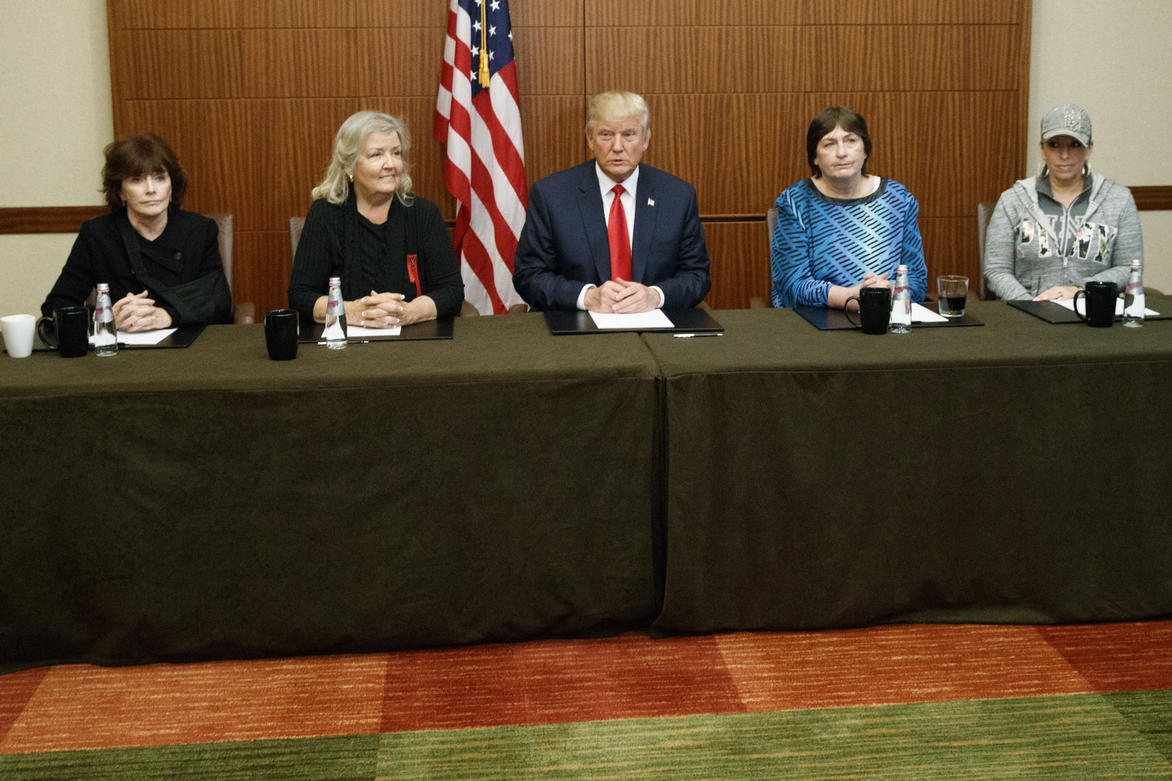
One of the most surreal images in this highly surreal presidential campaign was the press conference held by Donald Trump just before the town hall debate in St. Louis last Sunday. He assembled four women — three Bill Clinton accusers and one whose accused rapist had been represented by Hillary Clinton when she was an attorney — to talk down the Clintons and talk up Trump. With all due respect to the accusers, Trump created a sordid little spectacle, a preshow trick meant to intimidate Clinton and manipulate viewers. It was something out of a staged professional wrestling show. Our American political exchange was a wrestling show.
Watching that press conference unfold, I remembered with a sense of lost innocence the early years of reality TV, when people were still asking TV critics when-oh-when the genre was going to peter out, because it was definitely going to peter out, wasn’t it? There was a sense of disbelief that ordinary folks were willing to do anything — get married, get made over, get lost in a forest — in order to get on TV. They would give up their privacy and, often, their dignity. Some wondered if the well-known prediction credited to Andy Warhol — that everyone will be famous for 15 minutes — was going to become the understatement of the century.
The reality fusillade and its attendant concerns started in earnest in 2000, with “Who Wants to Marry a Multi-Millionaire’’ and “Survivor.’’ But the movies “EdTV’’ and “The Truman Show’’ had already articulated a sense that the reality genre, with its combustive mixture of exhibitionism and voyeurism, could be toxic. And Globe readers were beginning to express similar misgivings to me, qualms that I heard in person, in online chats, and in a regular flurry of e-mails and letters. For many, the predatory nature of habitually laughing at real people who do stupid, shallow things or who have been fooled by reality producers was worrisome.
I tried to acknowledge the potentially fascinating side of reality shows, the ways they could serve as mirrors of human nature, how they could be viewed as microcosmic social experiments. That first season of “Survivor,’’ for example, could be seen as an unblinking anatomy of American office politics, where alliances, skill, competition, trying to eliminate your strongest rival, and secret-keeping all came into play. Do bad guys always get ahead or is there a chance for good behavior to triumph? The show seemed to be addressing that question.
But I suspected, and began to voice in these pages, that the genre had qualities that, over time, could be corrosive. Some reality shows, particularly the talent contests, weren’t especially harsh, but most, from “Big Brother’’ to “The Surreal Life’’ and “The Anna Nicole Show,’’ contained negative qualities that brought out and celebrated the worst in people — the trash-talking, the deception, the worship of celebrity, the backstabbing. It was professional wresting but with real people instead of performers.
And it wasn’t only the participants who were going low; it was the audience, too, to some extent. Audiences were becoming inured to the odious features of the genre as it grew bigger and bigger. They were watching the shows in huge numbers, increasingly aware of, but undaunted by, the knowledge that it was all fake and scripted. They were supporting reality TV, and those who disapproved stopped caring. I no longer heard complaints from people; reality had become a reality.
The unappealing side of reality TV grew over the years, when it became louder and clearer to producers that confrontation and train wrecks, and not just sex, are what viewers respond to. The grim Lifetime drama “UnREAL’’ is a frightening portrait of how reality producers ruthlessly pit players against one another for ratings, how they edit characters into caricatures, and how the players themselves try to win attention by manufacturing screaming dramas. If there was ever value in watching the shows as social experiments, it was gone, leaving only a new level of celebrity somewhere between entertainment-news anchors and porn stars.
I don’t want to pretend that TV has ever been a pure environment, or that the lowering of our political dialogue this year is all reality TV’s fault. Recently, as part of its “Independent Lens’’ series, PBS aired the film “Best of Enemies,’’ which chronicled the 1968 debates between Gore Vidal and William F. Buckley. Those confrontations were as fierce and personal as anything on “Big Brother.’’
But Trump is a reality TV candidate, and many of us are reality viewers consciously or unconsciously willing to tolerate reality tricks after more than a decade of “Big Brother.’’ He is springing stunts like the debate-night press conference. And he is living by the principle that dignity gets you nowhere and shock and hostility are pluses. He plays to the cheap seats, and, alas, too often, the cheap seats are all filled.
Matthew Gilbert can be reached at gilbert@globe.com. Follow him on Twitter @MatthewGilbert.



